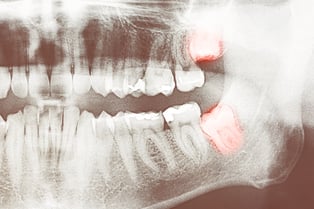 Wisdom teeth are the teeth at the very back of the dental arches and are usually the last ones to come out, if at all. Wisdom teeth were once used by our ancestors for extra chewing power for rough foods like meats, roots, nuts, and leaves. Due to the modern diet of softer foods and the use of utensils, wisdom teeth are no longer needed. In addition, as human jaws have become smaller with evolution, our mouths are no longer able to accommodate wisdom teeth, which is why wisdom teeth can lead to pain, infection, and other dental problems as they grow.
Wisdom teeth are the teeth at the very back of the dental arches and are usually the last ones to come out, if at all. Wisdom teeth were once used by our ancestors for extra chewing power for rough foods like meats, roots, nuts, and leaves. Due to the modern diet of softer foods and the use of utensils, wisdom teeth are no longer needed. In addition, as human jaws have become smaller with evolution, our mouths are no longer able to accommodate wisdom teeth, which is why wisdom teeth can lead to pain, infection, and other dental problems as they grow.
Extraction or removal of wisdom teeth has become a standard procedure to prevent future dental problems associated with wisdom teeth, like crowding and infection, even if currently they are not causing any problems. Since the procedure requires oral surgery and recovery time, it is important to know when it is and isn't necessary to remove your wisdom teeth.
When wisdom teeth do not need to be removed
When your wisdom teeth are fully erupted, correctly positioned in line with your other teeth and don't cause any dental pain or problems, you do not need to get them removed. However, it's important to note that due to their position in the back of the mouth, it's difficult to clean wisdom teeth, thus, they are prone to cavities. Proper dental hygiene is crucial to ensure your wisdom teeth stay healthy and don't cause dental problem in the future.
In addition, some people don't have wisdom teeth to begin with and, thus, don't have to worry about getting them extracted.
When wisdom teeth need to be removed
It's best to remove wisdom teeth when they are impacted, meaning they are not properly growing. Typically, impacted wisdom teeth lie at various angles, sometimes horizontally, and don't break through the gum line because there isn't enough space for them. Impacted teeth can push neighboring teeth, irritate the gums, and cause pain and other dental problems, including:
- Damage to surrounding teeth and their roots
- Cavities
- Inflamed gums
- Cysts
- Jaw damage
- Sinus issues
- Crooked teeth and crowding
Wisdom teeth can also partially-erupt through the gum line. This creates an opening for bacteria to get around the tooth, which can lead to an infection, and increases the risk of tooth decay and gum disease.
When to see a dentist for an evaluation
It is recommended to seek wisdom tooth evaluation between the ages of sixteen and nineteen. As you get older, your bones harden and removing wisdom teeth becomes more difficult. In addition, as you get older, you tend to heal longer and more recovery time may be needed post surgery. Waiting too long to get wisdom teeth removed can lead to complications like heavy bleeding, fractured teeth, and loss of movement in the jaw, which can be permanent.
Not sure if you have to get your wisdom teeth removed? Schedule an appointment with us for a proper wisdom tooth examination and treatment plan.

.jpg?width=712&name=GSD-Scalloped-Tongue-Causes-and-Treatment-Blog-01.27.2210.21.21%20(1).jpg)











.jpeg?width=425&name=GSD-How-to-Combat-Dental-Plaque-07.22.24-2%20(1).jpeg)



